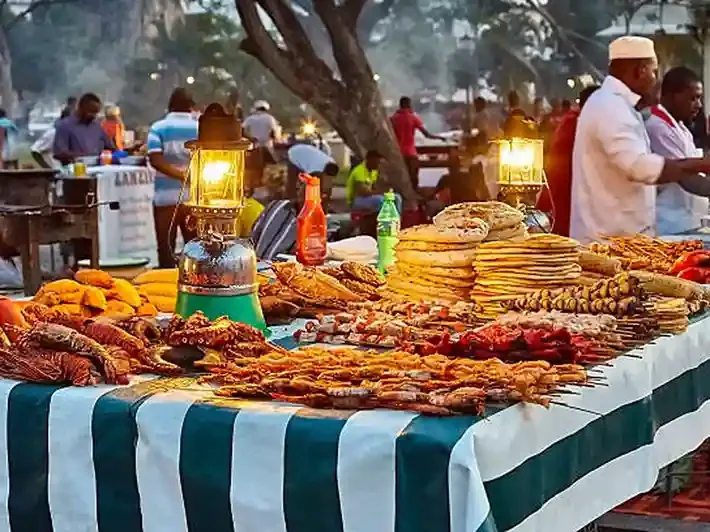Zanzibar Traditional Cuisine: Food & Culture Guide
Zanzibar traditional cuisine is a vibrant blend of African, Arab, Indian, and Persian flavors, shaped by centuries of trade and cultural exchange. From aromatic pilau rice to tangy urojo soup, the island’s food culture reflects its history as a spice trade hub. Join Capable Africa Tours to explore Swahili cuisine through spice tours, cooking classes, and local markets. This guide dives into Zanzibar’s culinary heritage, must-try dishes, recipes, and where to experience authentic Zanzibari food.
Discover Zanzibar’s Food Culture
Why Explore Zanzibar Food Culture?
Zanzibar’s food culture is a delicious reflection of its diverse history. Known as the “Spice Island,” Zanzibar blends African, Arab, Indian, and Persian influences into its Swahili cuisine. The island’s culinary traditions are rooted in its role as a trading hub, where spices like cloves, cinnamon, and cardamom shape every dish. From street food at Forodhani Night Market to home-cooked meals in Stone Town, Zanzibar offers a sensory journey for food lovers. With Capable Africa Tours, you can dive into this vibrant food scene through spice tours, cooking classes, and local dining experiences.
The Roots of Zanzibar Traditional Cuisine
Zanzibar’s culinary heritage is a melting pot of cultures. The island’s strategic location along ancient trade routes brought Arab, Indian, and Persian traders, who introduced spices, rice dishes, and cooking techniques. African influences added staples like cassava and coconut, while the Swahili people wove these elements into a unique cuisine. Spices in Zanzibar food, such as cloves and nutmeg, are not just flavor enhancers but a testament to the island’s history as a global spice trade center. This fusion creates dishes that are both bold and harmonious, making Zanzibar food culture a must-experience for travelers.
Must-Try Zanzibar Local Dishes
Zanzibar’s local dishes are as diverse as its history. Here are some highlights you shouldn’t miss:
- Pilau Rice: A fragrant rice dish cooked with spices like cloves, cardamom, and cinnamon, often served with meat or seafood.
- Zanzibar Pizza: A street food favorite, these savory pancakes are stuffed with ingredients like minced meat, eggs, or vegetables.
- Urojo Soup: A tangy, spicy soup with lentils, potatoes, and tamarind, topped with crispy bhajias and chutney.
- Octopus Curry: A creamy, coconut-based curry showcasing Zanzibar’s fresh seafood and bold spices.
- Mishkaki: Grilled meat skewers marinated in spices, perfect for a quick street food bite.
- Mandazi: Sweet, fried doughnuts often paired with tea or coffee for breakfast or dessert.
- Halwa: A sticky, sweet treat made with sugar, ghee, and spices, reflecting Persian influences.
These dishes are best enjoyed at local eateries or during cultural food tours with Capable Africa Tours, where you can taste and learn about their preparation.
Spices in Zanzibar Food: The Heart of Swahili Cuisine
Spices are the soul of Zanzibar’s cuisine. The island’s nickname, “Spice Island,” comes from its historical role in producing and trading cloves, nutmeg, cinnamon, and black pepper. These spices, grown on local plantations, are used generously in Zanzibari recipes. For example, cloves add warmth to pilau, while cardamom enhances chai tea. A spice tour with Capable Africa Tours lets you walk through plantations, smell fresh spices, and see how they’re used in traditional cooking. This hands-on experience deepens your appreciation for Zanzibar’s culinary traditions.
Where to Experience Zanzibar Food Culture
Zanzibar’s food scene thrives in its markets, restaurants, and cultural experiences. Here are top spots to dive in:
- Forodhani Night Market: Located in Stone Town, this lively market offers street foods like Zanzibar pizza, mishkaki, and fresh seafood.
- Stone Town Restaurants: Places like Emerson on Hurumzi serve traditional Swahili dishes with rooftop views.
- Spice Tours: Visit plantations to learn about spices and enjoy a home-cooked Swahili meal.
- Cooking Classes: Capable Africa Tours offers classes where you can learn to make urojo, pilau, or mandazi with local chefs.
- Village Homestays: Stay in rural areas like Jambiani to taste authentic home-cooked meals and connect with locals.
These experiences bring you closer to Zanzibar’s cultural food traditions and the people who keep them alive.
Zanzibari Recipes to Try at Home
Want to bring Zanzibar’s flavors to your kitchen? Here are two simple Zanzibari recipes to try:
Zanzibar Pilau Recipe
Ingredients (Serves 4):
- 2 cups basmati rice
- 500g chicken or beef
- 1 onion, chopped
- 2 tbsp vegetable oil
- 1 tsp cloves, 1 tsp cinnamon, 1 tsp cardamom
- 2 cups coconut milk
- 2 cups water
- Salt to taste
Instructions:
- Heat oil in a pot, sauté onions until golden.
- Add meat and spices, cook until browned.
- Stir in rice, coconut milk, and water. Bring to a boil.
- Reduce heat, cover, and simmer for 15–20 minutes until rice is cooked.
- Serve hot with a side of kachumbari (tomato salad).
Mandazi Recipe
Ingredients (Makes 12):
- 2 cups all-purpose flour
- 1/4 cup sugar
- 1 tsp baking powder
- 1/2 tsp cardamom
- 1/2 cup coconut milk
- 1 egg
- Oil for frying
Instructions:
- Mix flour, sugar, baking powder, and cardamom in a bowl.
- Add coconut milk and egg, knead into a soft dough.
- Roll out dough, cut into triangles.
- Fry in hot oil until golden brown on both sides.
- Drain on paper towels and serve warm.
These recipes capture the essence of Swahili cuisine and are perfect for recreating Zanzibar’s flavors at home.
Cultural Food Traditions in Zanzibar
Zanzibar’s food traditions go beyond taste—they’re a way of life. Meals are often shared, reflecting the island’s communal spirit. During Ramadan, families break their fast with dates and halwa, while weddings feature lavish spreads of biryani and sweets. Spices play a ceremonial role, with cloves and saffron used in special dishes. Festivals like Sauti za Busara or Mwaka Kogwa bring food stalls serving urojo and grilled seafood, uniting locals and visitors. Joining a cultural food tour with Capable Africa Tours lets you experience these traditions firsthand.
Tips for Enjoying Zanzibar’s Culinary Scene
To fully enjoy Zanzibar’s food culture, keep these tips in mind:
- Visit Local Markets: Darajani Market in Stone Town offers fresh spices, fruits, and snacks.
- Try Street Food Safely: Choose busy stalls at Forodhani for fresh, hygienic food.
- Respect Dietary Customs: Zanzibar is predominantly Muslim, so pork is rare, and halal options are common.
- Join a Cooking Class: Learn authentic recipes with hands-on guidance from local chefs.
- Book Food Tours Early: Spice tours and culinary experiences can fill up, so plan ahead with Capable Africa Tours.
Ready to Taste Zanzibar with Capable Africa Tours?
Immerse yourself in Zanzibar’s rich food culture with Capable Africa Tours. From spice tours to cooking classes, our expert guides bring the island’s culinary traditions to life. Pair your food adventure with beach relaxation or a Tanzania safari for an unforgettable journey.
- Authentic Culinary Experiences with Local Chefs
- Customizable Food and Cultural Tours
- Seamless Beach and Spice Tour Packages
- 90% Customer Satisfaction Rate
- Commitment to Sustainable Tourism



